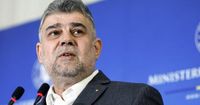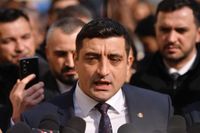In a statement on March 21, 2025, Romanian Prime Minister Marcel Ciolacu expressed optimism about the nation's entry into the U.S. Visa Waiver program, declaring that efforts made by his government have had "irreversible success" for Romanian citizens. This declaration follows ongoing discussions about the program amid concerns raised by the Trump administration over potential delays.
Ciolacu took to Facebook to address political speculation surrounding a slight postponement associated with technical barriers. "We have met all the technical and political conditions. There is no doubt about this. Therefore, I appeal to those who are speculating politically about a temporary delay to refrain from doing so," he urged, discrediting those he called "buffoons" who might disrupt progress. He further emphasized, "We entered Schengen and now the Visa Waiver program with great efforts. We do not need anyone ruining this now."
During these discussions, AUR President George Simion criticized the government for what he termed undemocratic actions that threaten Romania's ability to strengthen international relations. On the same day as Ciolacu's remarks, Simion stated via social media that the current government coalition is betraying Romanian citizens' trust. "The government cannot expect success while acting undemocratically," he warned, underscoring his frustration over the apparent lack of urgency regarding the Visa Waiver program's implementation.
His criticism resonates amidst the backdrop of ongoing dialogue within the U.S. regarding immigration and border control, which could complicate Romania's aspirations. As noted by Ambassador Andrei Muraru, no official information has signaled any changes to the previously set timeline for the Visa Waiver's effective date, which is projected to remove tourist visa requirements by the end of March 2025.
The Ministry of Foreign Affairs reiterated on March 20 that the Romanian embassy in Washington, D.C. is actively engaging with U.S. authorities, particularly the Department of Homeland Security. They remain confident that operationalizing the Visa Waiver Program will contribute to border security and combat illegal migration. A spokesperson stated, "There is no official communication regarding changing the date considered for updating the ESTA travel authorization system."
Despite the assertions from government officials, the shadow of a potential delay looms, particularly with discussions occurring within the Trump administration prioritizing stricter immigration policies. AUR's Simion cautioned that such approach jeopardizes Romania's position in the international community.
Ciolacu's defense of the government's stance highlights a broader battle for public confidence. In noting his administration's achievements, Ciolacu not only responded to Simion but also laid out a narrative aimed at reinforcing a sense of progress among Romanian citizens. “Using this topic for narrow electoral interests harms both Romania and its citizens,” he stated, illustrating the intertwining of domestic politics with international policy.
Despite tensions between the political factions, Ciolacu aims to foster cooperation moving forward, urging against politicizing the matter further. As he asserted, the potential benefits of the Visa Waiver are significant, allowing Romanians to travel freely and enhancing diplomatic ties between Romania and the U.S. “We want our citizens to have the same privileges other European states have,” he expressed, issuing a clear directive amid growing electoral pressures.
The deadline for the elimination of tourist visas is projected around March 31, 2025. This move is anticipated to facilitate better connectivity between the nations, thereby strengthening bilateral relations. Romanian citizens, who have faced tight visa regulations, look to this program with hope as it promises greater freedom for travel.
Citizens remain anxiously hopeful about progress. However, the continuing political discourse runs the risk of impacting Romania’s positioning in the global arena, further complicating what should be a straightforward path to the Visa Waiver program. As discussions continue, many Romanians hold their breath, hoping for a smooth transition away from visa requirements altogether.
As the situation evolves, observers will undoubtedly keep a close eye on any announcements from both the Romanian government and U.S. authorities regarding the Visa Waiver program, knowing that the future success hinges on diplomatic finesse and political stability.





